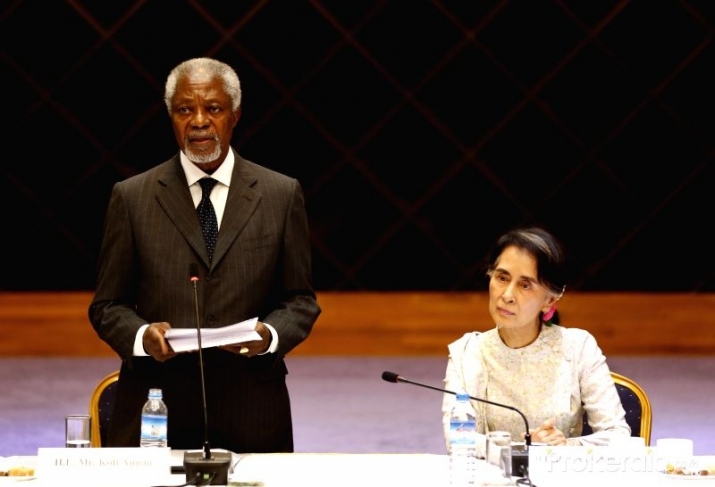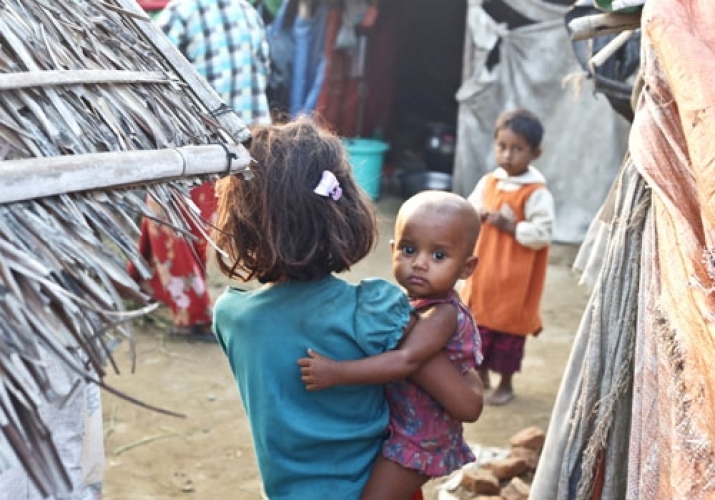NEWS
Buddhist Hardliners Protest Annan’s Visit to Myanmar’s Troubled Rakhine State
 Former UN secretary-general Kofi Annan and Myanmar state counselor and foreign minister Aung San Suu Kyi at the first meeting of the Rakhine Advisory Commission on Monday. Photo by Thein Zaw. From prokerala.com
Former UN secretary-general Kofi Annan and Myanmar state counselor and foreign minister Aung San Suu Kyi at the first meeting of the Rakhine Advisory Commission on Monday. Photo by Thein Zaw. From prokerala.comSome 1,000 Buddhists in Sittwe, the capital of Myanmar’s strife-torn Rakhine State, on Tuesday protested a visit by former United Nations secretary-general Kofi Annan, who has been appointed to chair the Rakhine Advisory Commission to address ethnic tensions in the troubled region.
Annan is one of three international members appointed to the nine-person commission set up by Aung San Suu Kyi, Myanmar’s de facto leader,* and tasked with resolving the unrest in the state. The panel also includes Lebanese politician Ghassan Salamé, who was UN special advisor to Annan from 2003–6, and Dutch diplomat Laetitia van den Assum, who was special advisor to UNAIDS from 2005–6. Annan, who arrived in Myanmar for a six-day visit on Sunday, is scheduled to visit Myanmar’s new capital Naypyidaw and Rakhine State on 6–7 September and will leave the country on 9 September, according to the Myanmar’s Ministry of Information.
Rakhine State’s dominant Arakan National Party (ANP) and the Rakhine Women’s Network led the protest near Sittwe’s airport, where Annan and the other members of the panel arrived on Tuesday morning. “Rakhine State is in Myanmar and our country has its own sovereignty and there is no way we can accept a commission that is formed by foreigners,” said ANP official Aung Than Wai. (ABC News)
Religious tensions between Buddhists and Muslims have simmered in Myanmar for almost half a century, but came to a head with violent clashes in 2012 that killed more than 100 people. Rakhine State, one of the country’s poorest, is also one of the most sensitive and conflict-prone regions in Myanmar, particularly since outbreaks of anti-Muslim violence in 2012 and 2013, following which 140,000 people, most of them Rohingya Muslims, were displaced. Most remain in squalid resettlement camps, with limited access to education, healthcare, or employment opportunities. During his visit, Annan and the other members of the commission will visit some of the camps and meet members of political and religious groups in the state.
However, the ANP remained adamant that it would not meet or work with the commission. ANP secretary U Tun Aung Kyaw insisted on Monday that the party remained opposed to the commission entirely. “We won’t meet with the commission even if they invited us,” he said. “But we told Rakhine civil society organisations to meet with the commission and to convey the real situation in Rakhine State.” (Myanmar Times)
On Monday, Annan and Suu Kyi oversaw the commission’s first meeting in the country's former capital Yangon, during which Suu Kyi reaffirmed the commission’s mandate to investigate the causes of the conflict in Rakhine State and to foster a process of reconciliation between the region’s two main religious communities.
“You will see for yourself all the problems on the ground now. You will be able to assess for yourself the roots of the problems itself, not in one day, not in one week. But I am confident that you will get there, that you will find the answers because you are truly intent on looking for them,” Suu Kyi told the panel’s members on Monday. “All members of the commission will help us to find a way forward. We believe that you will give us fair and valuable advice. I believe that it will be based on goodwill to all our people as well as people all over the world. And based on your advice, we will try the best for our country.” (ABC News, The Irrawaddy)
 A young girl carries a toddler at a resettlement camp in Myanmar's Rakhine State. From mmtimes.com
A young girl carries a toddler at a resettlement camp in Myanmar's Rakhine State. From mmtimes.comMyanmar classifies Rohingya Muslims as stateless foreign migrants even though they have lived in Myanmar for generations. The country’s population also includes Muslims from other ethnic groups. According to the Washington, DC-based Pew Research Center, Buddhists make up about 80 per cent of Myanmar’s population of some 52 million, and Muslims just 4 per cent. The radical nationalist Committee for the Protection of Nationality and Religion (Ma Ba Tha), a collective of hardline Buddhist abbots and influential monks founded in 2013, has previously stoked religious division by asserting that Myanmar’s Buddhist population and culture is under threat from Islam. More recently, major figures from Myanmar’s mainstream political and religious communities have publically spoken out against Ma Ba Tha, saying the group’s policies are not representative of the country’s Buddhist sangha, which has some 250,000 members according to a government estimate, and do not reflect the essence of Buddhism.
* Suu Kyi is barred from the office of president by a junta-drafted constitution, but oversees the running of the government as state counselor and foreign minister.
See more
1,000 in Myanmar Protest Annan's Role on Rohingya Commission (ABC News)
Kofi Annan ‘Confident’ in Arakan State Advisory Commission’s Mandate (The Irrawaddy)
Suu Kyi, Annan kick off Arakan panel (DVB)
As Rakhine body chair, Kofi Annan takes on Myanmar politics’ third rail (Myanmar Times)
Rakhine commission chair Kofi Annan to meet state counselor (Myanmar Times)
Related
Myanmar Picks Former UN Chief Kofi Annan to Head Buddhist-Muslim Rakhine Commission (Buddhistdoor Global)
Myanmar to Form Buddhist-Muslim Commission to Address Humanitarian Crisis in Rakhine State (Buddhistdoor Global)
Buddhistdoor View: Reconciling Nationalism and Buddhism (Buddhistdoor Global)
Aung San Suu Kyi to Lead Peace Effort in Rakhine Against Backdrop of Political Complications (Buddhistdoor Global)
Top Buddhist Authority in Myanmar Begins Moving Against Extremist Buddhist Organizations (Buddhistdoor Global)
Lone Buddhist Reaches Out to Rohingya Children in Myanmar (Buddhistdoor Global)
Aung San Suu Kyi Urges Tolerance and Unity in Myanmar’s Troubled Rakhine State (Buddhistdoor Global)














